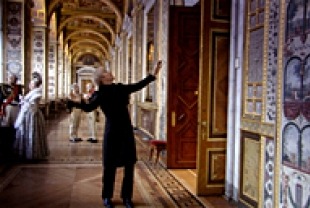In Earth Angels, Shaun McNiff describes a visit to the Peabody Museum which he regards as a collection of the spirits of previous generations, his private temple of the imagination, and as a treasury of images and soulful things. He wanders through its corridors and find himself an active participant in the past. He puts himself into the skins of adventurers and pioneers engaged in various quests. When he walks out of the Peabody Museum, he has enriched his repertoire of experiences and expanded his soul. For McNiff, the trip to this hallowed place has been a kind of pilgrimage.
There is some of that same spirit in this enchanting Russian film directed by Alexander Sokurov. A filmmaker mysteriously finds himself in St. Petersburg's Winter Palace in the early 1700s. He is invisible and baffled as to how he got there and why. Then he meets the Marquis (Sergey Dreiden), a sophisticated and clever French diplomat from the nineteenth century who serves as his tour guide. This world weary gentleman knows a lot about the paintings on the walls although a blind woman who loves art is able to tell him a thing or two he didn't know. The Marquis is quite mesmerized by the opulence and the splendor of the place and tries to imagine the Russian Tsars spending time with the great art works of Europe as part of their daily activities.
The two outsiders are privy to Catherine the Great watching a play about herself and then running away frantically in search of a bathroom. They witness the quiet dignity of Nicholas and Alexander at meal with their children unaware of what lies ahead for them. They wander into the emperor's official reception for a Persian ambassador where the Marquis has some special moments of magic as he dances the mazurka with various women in the Grand Nicholas Hall. The music for this ball is provided by a symphony orchestra conducted by Valeri Gergiev. As these rich and pampered uniformed officers, members of the court, and wealthy women file out of the hall, they have no idea of the tragedies that will befall their offspring in the terrible wars, political turmoils, and mass executions of the twentieth century.
Russian Ark is a delight to behold with its salute to the considerable pleasures of architecture, painting, sculpture, theatre, and music. This treasure trove of culture in the Hermitage Museum is delivered to our senses by East German steadicam operator Tilman Buttner (Run, Lola, Run). The film consists of a single 90-minute take. This technical feat is a wonder to behold.
